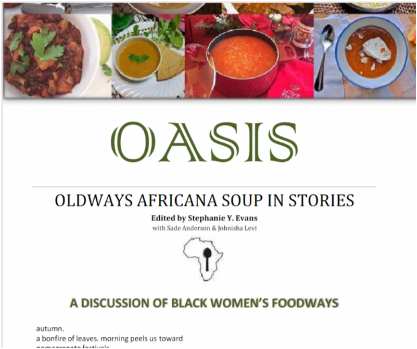|
Written by Sureshi M. Jayawardene “OASIS: Oldways Africana Soup in Stories” is a collection of Black women’s recipes and life stories, curated by Dr. Stephanie Y. Evans. In collaboration with Sade Anderson and Johnisha Levi, Dr. Evans has compiled an electronically accessible collection of “culturally-informed soup recipes” that help expand our knowledge of Black women’s nutritional practices, knowledge, and wellness. OASIS offers personal vignettes and recipes that “explore identity, geography, health, and self-care.” This recipe book brings together the “20 cooks, chefs, researchers, storytellers, foodies, farmers, nutritionists, historians, activists, food bloggers, and wellness workers” to increase our understanding of Black women’s health and wellness practices. Furthermore, Dr. Evans has taken a sweeping diasporic approach, featuring soup recipes and narratives from Nigeria to Guyana, to Tobago, the Carolinas, and New Mexico. She writes that “soup is a perfect meal that allows us to simmer down” and invites readers to draw inspiration from OASIS to document their own stories and recipes, but also to expand their own wellness menus. Dr. Evans stresses that Black women’s wellness is an afrofuturistic situation and draws on Anna Julia Cooper’s notion of “regeneration”: that we look to the past for wisdom, the interior for strength, and the future for faith and hope. Dr. Evans herself offers a recipe that forms part of her self-care regimen: Green Chile Chicken Stew! She describes why it is such a staple for her, given her own busy routine and lifestyle. Green Chile Chicken Stew Dr. Evans’ recipe for Green Chile Chicken Stew is one of many easy-to-make, nutritious, and culturally grounded modes of exploring and uncovering Black women’s nutritional knowledge and practices.
OASIS can be accessed HERE. Look, download, read the life stories, try out the soups, and help support the important work that Dr. Evans has embarked upon. In a time when nutrition, fitness, and healthy lifestyles are trendy and gaining momentum through social media platforms, OASIS and Dr. Evans’ work is critical for how Black communities approach health and wellness in culturally rooted ways. Combining age-old family recipes that Black women have passed down and newer on-the-go recipes that Black women have created as they have moved through various circumstances provide a unique platform for more Black women to participate in. Whereas physical books face the threat of obsoleting with the high saturation of digital modes of health and wellness, OASIS gives us something tangible with its compilation of Black women’s history, nutritional wisdom and practices, and Black women’s life stories. One of the potential outcomes of OASIS and the individuals involved in this work is that it doesn’t just promote health and wellness among Black women, but encourages us to look deeply at our historical and cultural stores for how to address our nutritional needs, food consumption, and overall wellness and health.
0 Comments
Leave a Reply. |
Archives
January 2019
Categories
All
|

 RSS Feed
RSS Feed